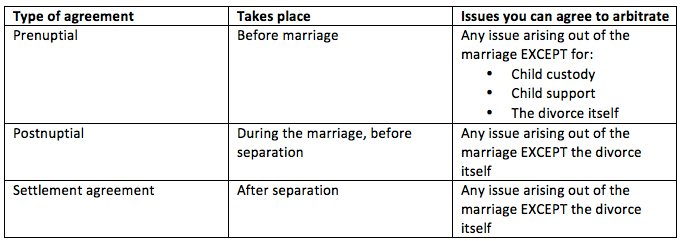WE FIGHT TO WIN!
Arbitration in Family Law Cases
For child custody and property division cases in North Carolina, pre-trial mediation is mandatory. It gives adversarial parties the chance to resolve these issues outside of court with their attorneys and a neutral third party. If the mediator can help the parties come to an agreement, a Property Settlement or Separation Agreement can be drawn up instead of having to litigate the issue in court. This can greatly decrease the amount of time it takes for a judge to grant the divorce. Alternative dispute resolution like mediation can save precious time, money and emotional energy for all parties involved during what is otherwise a very draining time.
How is arbitration different from mediation?Another type of alternative dispute resolution is called arbitration. Mediation is driven more by the individual parties while the mediator facilitates negotiation between the two sides. In arbitration, on the on other hand, the third-party neutral, called an arbitrator, acts more as an authoritative figure similar to a judge and issues binding judgments on specific issues. Arbitration is not court-ordered in family law cases in North Carolina like mediation is, but is similarly favored by the courts for its resource-saving abilities. North Carolina was the first state that adopted an arbitration statute specifically for family law cases, and this law remains one of the most comprehensive family law arbitration acts today.
When can I arbitrate what in North Carolina?North Carolina’s Family Law Arbitration Act (N.C.G.S. 50-41) lays out that a couple can agree ahead of time to arbitrate any issue that arises out a marriage—except for the divorce itself—during or after marriage. This means the arbitration clause would be in a postnuptial or settlement agreement. Couples can also agree ahead of time to arbitrate any issue except for child custody, child support, or the divorce itself in a prenuptial agreement before marriage.
Although prenuptial and postnuptial agreements are viewed as unromantic by some, they can really be wonderful protection mechanisms for either party in the event of separation or divorce. If you agree to arbitrate any future disagreements out of court if you decide to end the relationship, this can save you not only time and money but also from the potentially nasty and more public aspects of a divorce that is strung out in court litigation.

If you do not agree ahead of time to arbitrate, you may still be able to avail yourself of the cost-effective benefits of an arbitration proceeding.
Who will arbitrate the proceeding?If you contract ahead of time to arbitrate issues arising out of the marriage in one of the manners discussed above, you can stipulate:
- Which specific person(s) you would like to arbitrate, and/or
- If you would like a panel of several arbitrators instead of the default of just one.
Your respective attorneys can help you decide on an appropriate individual to arbitrate if you contract for it ahead of time. While technically arbitrators do not require any one certification, arbitrators are often lawyers trained in alternative dispute resolution and the applicable law. Having an arbitrator with a background understanding in the law can be important to the cost and time-effectiveness of arbitration; if you both want the family pastor or a reasonable friend to do it, for example, you can defeat the point of arbitration if this person is not familiar with applicable family law.
If you do not specify which or how many arbitrators ahead of time, or if you cannot agree, the court will appoint a single arbitrator to lead your proceeding from an established arbitration organization that the court considers sufficiently qualified in family law arbitration. (Although there is no specific certification a person must have to be allowed act as an arbitrator, numerous professional organizations for arbitrators exist.)
What other arbitration issues are there?Like many other states, North Carolina has also adopted the much broader Revised Uniform Arbitration Act. While it is possible to arbitrate certain family law issues under this act, the Family Law Arbitration Act is much more tailored for the unique issues faced in family law matters. Your attorney will need to specify the appropriate act in any agreement or consent to arbitrate.
Arbitration, like mediation, can be a cost-effective way to resolve family law matters outside of court. If you are thinking about including an arbitration provision in a family law contract, or are facing divorce, it is important to discuss your case and the appropriateness of arbitration with a skilled and experienced family law attorney. The dedicated, board-certified attorneys of Arnold & Smith, PLLC’s Family Law Practice have practiced in the family law courts throughout North Carolina for years. Contact us today for an initial consultation.
 Charlotte Divorce Lawyers Arnold & Smith Home
Charlotte Divorce Lawyers Arnold & Smith Home





















